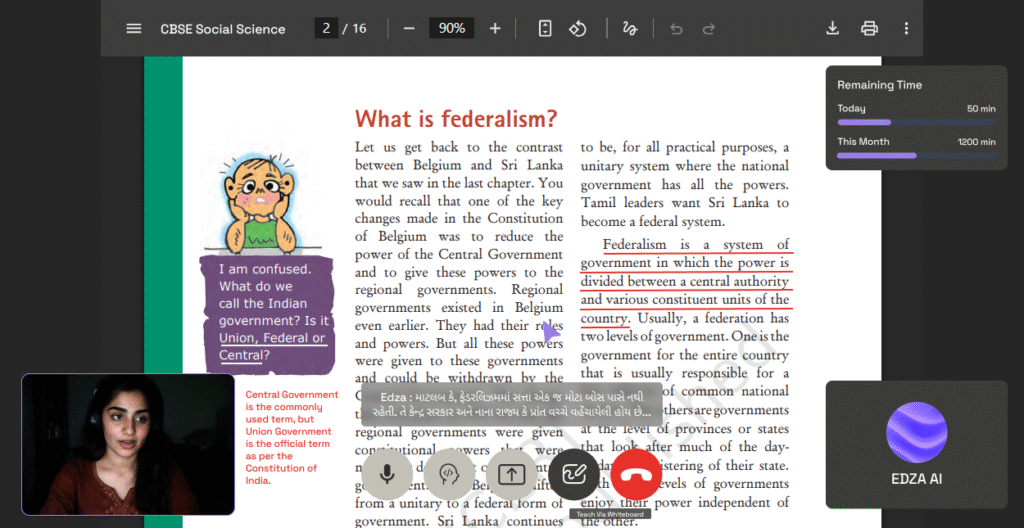AI Personal Tutor vs. 1,000-Seat Livestreams: From Searchbots to Super-Batches and How Edza AI Could Turn the Tide

As digital tools have grown ubiquitous in Indian education, students today have access to platforms ranging from search engines to large language models (LLMs). Yet despite their widespread use, these tools remain peripheral to actual exam preparation. For many of these Indian students, the distinction is clear: search engines are for quick facts, not outcome-oriented exam prep.
Recent studies suggest that while AI bots are commonly used for project ideas, or MCQs, but they are rarely the primary method for exam-focused study. Students preparing for school-level board exams still rely heavily on structured, syllabus-aligned content be it from tutors, peer groups, or specialised EdTech video-based livestream platforms.
Students Search: But They Don’t Study There
A 2025 study analyzing student interactions with ChatGPT found that the most frequent uses were solving MCQs and generating examples, while definitions, and step-by-step problem-solving accounted for significantly lower percentages highlighting that students often do not use ChatGPT as a comprehensive tutor, but rather for specific project-related or research-oriented tasks [1].
A 2023 survey on India’s competitive learning ecosystem observed that students continued to prefer board-specific lectures and coaching institutes–curated notes with higher trust in structured resources aligned with their exam expectations [2].
A Centre for Policy Research and Governance (CPRG) study of 6,090 Delhi college students found that only 6% viewed AI outputs as highly accurate. While nearly 70% reported issues like incorrect answers or lack of customization, and 49% struggled to understand responses [3].
Why Indian Exam Prep Requires More Than Answers
Unlike casual learning contexts, Indian school and board exam preparation demands:
• Precision in syllabus-specific coverage
• Step-based answer structuring
• Awareness of CBSE/state marking schemes
• Personalised revision strategies
• Language fluency across regional mediums
Generic AI chatbots, while broad in scope, do not account for these needs. They cannot track and precisely evaluate performance, and offer no adaptation based on the student’s past mistakes or current chapter context. The generic tools are built to answer broadly not to teach with outcome-oriented precision.
Live Lectures and Tuitions: The Current Workaround
In the absence of effective tutoring alternatives, students often fall back on livestream lectures or tuition batches. These, however, have their own limitations:
• Sky-high pupil-teacher ratios, especially in online livestreams with thousands of attendees
• Low interactivity, with few chances for real-time doubt resolution
• Generic pacing, often detached from the learner’s pace or prior understanding
The result is that even these systems, while better than searchbots, are not deeply personalised or responsive to the student’s actual exam-readiness.
Where Edza AI Fits In Amid this backdrop
Edza AI has emerged as a syllabus and mark-aware, precision and outcome-oriented AI Personal Tutor, explicitly built with a mission to rehumaise tutoring rather than broad knowledge delivery for every Indian student. Other than the difference in core responses and mission, unlike general-purpose AI bots, Edza AI also:
• Co-solves problems on a whiteboard, step by step, rather than just stating answers
• Sees the student’s textbook or handwritten notes via screenshare and adapts explanations accordingly in a syllabus and mark-aware manner
• Voice interaction in Indian languages, enabling tutoring in the learner’s preferred medium
• Via memory, remembers daily progress, learning gaps and past mistakes, for adaptive tests and targeted revision
• Drafts adaptive tests based on ongoing progress so that students don’t have to complete full syllabus to give static tests which creates backlog
Whereas searchbots were designed to replicate or extend search engines, Edza AI was designed to replicate the best of human tutoring personalised, adaptive, syllabus and mark-aware, and outcome-focused.
A Shift Toward Outcome-Oriented AI Tutoring
The key difference lies in intent and structure. Generic AI tools were built to serve a wide range of informational needs spanning law, medicine, literature, and entertainment. They were not built to follow just a CBSE marking scheme or draft an adaptive test based on a student’s last two mistakes or analyse a student’s current learning gap with voice on a whiteboard.
Edza AI, by contrast, was developed with an objective to improve exam-specific or academic outcomes for school students by acting as a master of one domain and not a jack of all trades. It does not attempt to answer every question in the world. It attempts to teach well-defined chapters, based on past papers, exam answer key’s expectations, and the individual student’s regular outcome-focused progress journey.
Conclusion
In India, students do not study from search engines. They use them but only as supplements. For real academic progress, especially in a high-stakes exam ecosystem, they need structure, clarity, adaptive nature and genuine conversations. As traditional models like tuitions and online lectures strain under scale and generic content, AI tutors that are personalised, syllabus-aware, student result improvement-focused and performance-tracking may become essential. Edza AI represents one such direction, not replacing schools, but filling the growing vacuum of personal attention in digital education. Edza AI is expanding to Class 11–12 boards starting August 15, 2025.
References
[1] Singh, V., & Agrawal, R. (2025). Exploring the Role of Generative AI in Indian School Education: A Quantitative Study on ChatGPT’s Adoption Patterns. arXiv preprint arXiv:2505.24126. https://arxiv.org/abs/2505.24126
[2] George, A. Shaji. (2023). Insights into the Competitive Landscape of Indian Entrance Exam Market: A Comprehensive Survey. 01. 63-89. 10.5281/zenodo.7855578
[3] Pandey, V. (2024, March 28). Half of Delhi students surveyed rely on AI for studies, but trust and access remain hurdles: Study. The Times of India. https://timesofindia.indiatimes.com/city/delhi/half-of-delhi-students-surveyed-rely-on-ai-for-studies-but-trust-and-access-remain-hurdles-study/articleshow/122393200.cms
#EdzaAI #AIForEducation #1on1Tutoring #AITutoring #Hacktivspace




